NHS system for seriously ill people requiring home care is struggling to provide sufficient support.
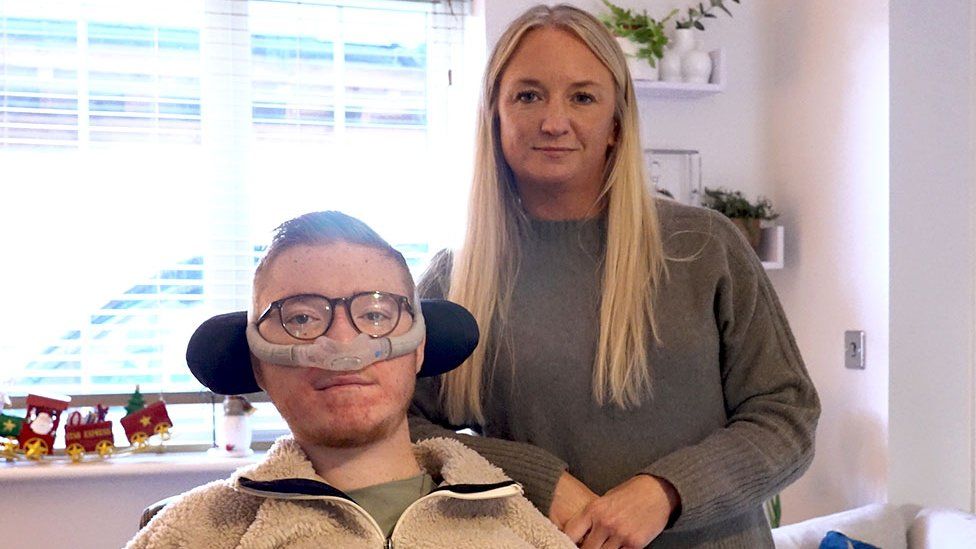 Image source, Family pic
Image source, Family picFamilies of people with complex medical needs are warning the NHS system that funds their care at home is struggling to provide sufficient support.
Despite recent significant increases in spending on Continuing Healthcare, experts say staff shortages and rising prices mean families are lacking help.
Some say at times they are so exhausted from providing care, they worry about the safety of their relatives.
The government says it has invested billions into health and social care.
We’ve followed 24-year-old Declan Spencer for 10 months, witnessing how the repeated breakdown of his care has left his mother having to provide it by herself, day and night.

Meeting Declan and his mother Alex, you immediately understand the warmth and strength of their relationship.
They chat at the table about his dating app experiences as Alex feeds him breakfast, interrupted by calls from a care company and specialist equipment provider that need her attention.
“Normally you would get annoyed with your parent occasionally, but that never happens,” Declan explains.
“But she can’t do all my care. It’s a lot of work for one person.”
Declan has a severe and progressive muscle wastage condition known as Duchenne muscular dystrophy and is unable to move unassisted. He requires a ventilator to breathe and lives with chronic heart and respiratory failure.
The care he requires at his family home in Leicestershire should be met by the NHS Continuing Healthcare scheme (CHC), which is designed to enable people with the highest and most complex needs to live outside of hospital.
At least 16,000 people in England and Wales are in a situation like Declan’s, having their long-term care, in their own home, funded through the scheme. Others may receive “fast-track” care for the final months of their lives, or have a care home place funded.
Scotland and Northern Ireland have different approaches to managing patients with high-level healthcare needs at home.
Declan is entitled to 24/7 support – plus extra help in the morning and before bed. He and Alex have been asking only for care overnight and during her working hours – but repeatedly they have faced a shortfall in care workers.
Through their video diaries, email logs, phone calls and messages, we have seen the toll this has taken on them.
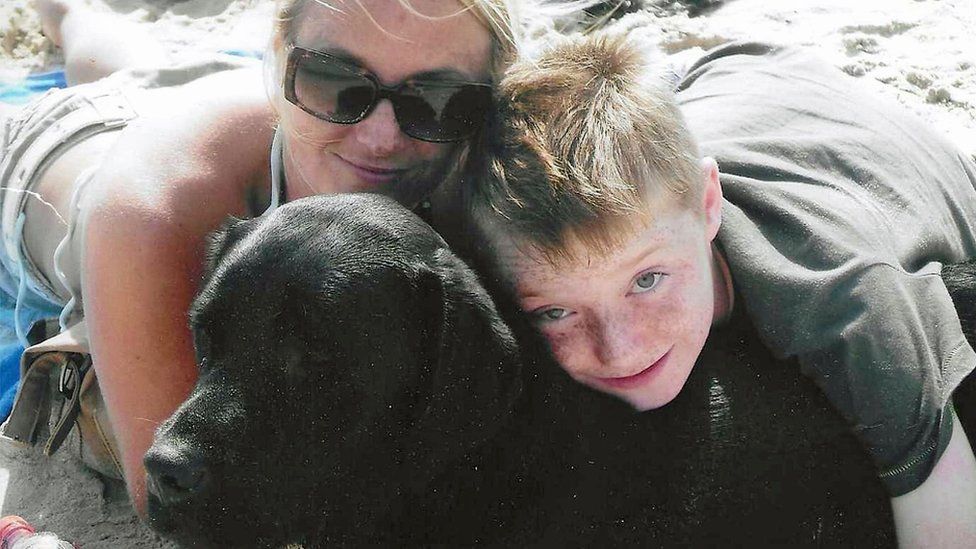
Image source, Family pic
Already living with the realisation of Declan’s declining health, finding support has added pressure and stress, with Alex standing in when no-one is available.
She has given up one of her jobs and had a mental health breakdown. On one occasion she remained awake for 60 hours caring for Declan and monitoring his equipment.
If there was an issue with his ventilator overnight, she says, “it could potentially end his life”.
Declan’s CHC team said they “always ensure a patient’s health care needs are met”, but cannot always commission the support families would prefer. It had offered to find Declan a temporary place in a care home, which the family declined, saying a suitable location with staff trained on ventilators would not have been possible at short notice.
Guidelines state that patients should always have the support set out by their care plan.
But the company providing NHS England’s advice line, Beacon, told the BBC it had seen a sharp rise in calls from families “who just sound incredibly desperate, upset, stressed, exhausted, because the care package isn’t working for them, and [they] are struggling to get anybody to listen to them”.
Its managing director, Dan Harbour, said the Continuing Healthcare scheme was “in a perfect storm of financial constraints and significant recruitment challenges”.
Integrated Care Boards [ICBs] decide the support package an individual receives, introduce families to their approved care agencies and monitor the quality of care provided. Their representatives told the BBC they were grappling with a lack of experienced care workers, at a time when patients were living longer and with greater levels of need.
Declan says the anxiety caused by his care situation has left him unable to sleep.
His NHS budget for care agencies has been £18.87 an hour – of which a smaller sum is paid to the carers themselves.
The family and Declan’s local CHC team, NHS Midlands and Lancashire Commissioning Support Unit, have struggled to find sufficiently trained and experienced carers within this price.
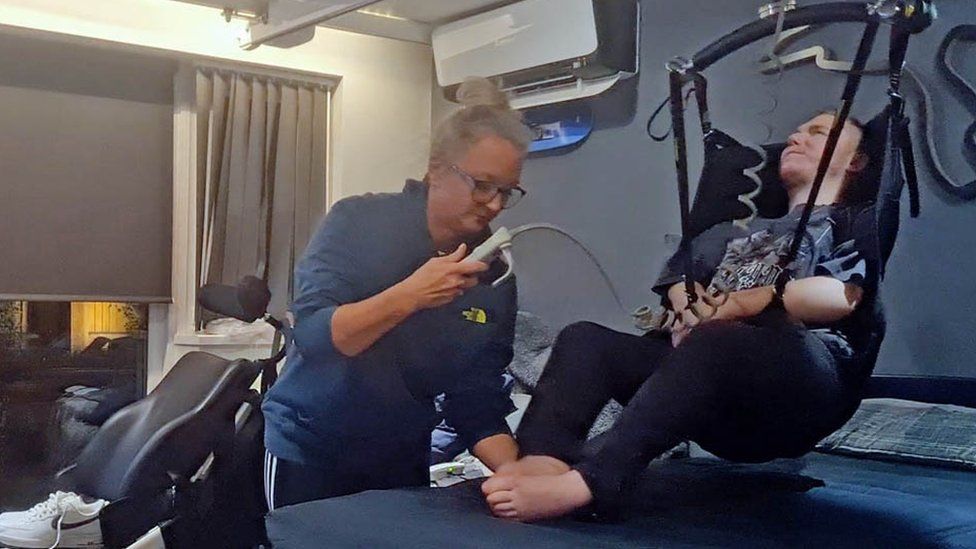
“Dec’s got high-level needs,” says Alex. “Doing the suctioning and the cough assist machine [to clear his airways]. Troubleshooting the ventilator. Knowing the difference between him going into respiratory arrest and cardiac arrest.
“His life is totally dependent on the person looking after him.
“But I’ve had carers crying on my shoulders, saying ‘I’m not a nurse, this is too technical for me’.”
“They are meant to have been trained on my equipment,” says Declan. “But I have some who come in knowing nothing.”
The family say Declan’s CHC team has repeatedly downplayed his needs when introducing them to new care companies.
In one instance, in an email seen by the BBC, a care company told Declan’s CHC team that his needs were “more complex” than stated to them, and “we would not be able to meet all requirements safely”.
Declan’s CHC team said their approved care agencies underwent regular training and “have the necessary knowledge, experience and skills to provide suitable care”.
Alex estimates 60 carers have entered Declan’s life in the past two years – including many who meet him, learn about his needs, but never start. Others leave shortly after their first shift, overwhelmed by his level of need.
“It’s made him feel like a burden,” Alex says.
The family are also battling against a nationwide shortage of care sector workers, which experts say is underpinned by poor levels of pay.
Under the Continuing Healthcare framework, this shortage should not mean the responsibility for care falls on the patient’s family.
One Integrated Care Board told the BBC when care workers regularly could not be sought, it would raise the hourly pay rates, and hire nurses on a full-time basis until care workers were found.
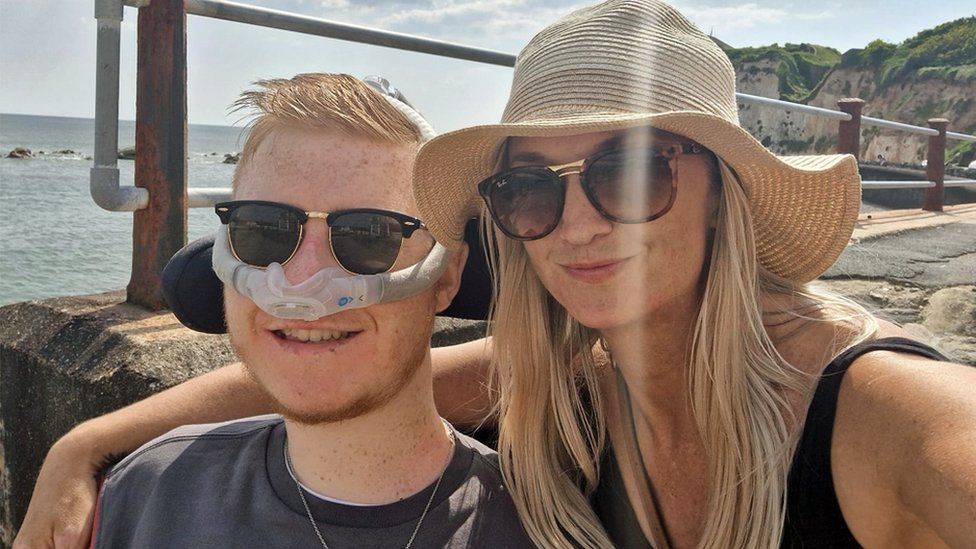
Image source, Family pic
Alex says the stress of arranging care has greatly affected her mental health – to the point she has been very close to suicide.
“After Dec had been in hospital with pneumonia [in October], he’d deteriorated a lot,” she adds. “[His CHC team] didn’t ask if we needed any extra help.”
By February, two of Declan’s medical specialists had written to his local NHS team saying he required an increase in his care package as his needs had – one specialist said – “drastically increased” since his hospitalisation. Three months on, this was not yet in place.
In emails, his CHC team told the family it had been following procedure for increasing care packages.
“Then everything changed,” explains Alex.
In May, the family received the news from doctors they had feared. Declan is now considered as “end-of-life” and has months to live.
“The doctors found Declan’s kidneys weren’t coping very well and told us he can’t take his heart medication any more, which was our biggest hope of keeping him here longer.”
Declan’s consultant wrote to his CHC team, saying he needed additional care. It took four weeks for this to be approved.
“We’re now eligible for 24-hour support with a nurse and healthcare assistant, but realistically it’s not happening because we can’t find the staff,” says Alex.
“I’m still staying up overnight on my own to care for him. And it’s worse than before, because Dec’s health needs are now greater.
“If decisions over Dec’s care had been made sooner, we wouldn’t be in this horrendous situation.”
The teams commissioning and managing Declan’s care – Leicester, Leicestershire and Rutland ICB and NHS Midlands and Lancashire Commissioning Support Unit – told us they were continuing to work with the family to ensure Declan has the care he needs.
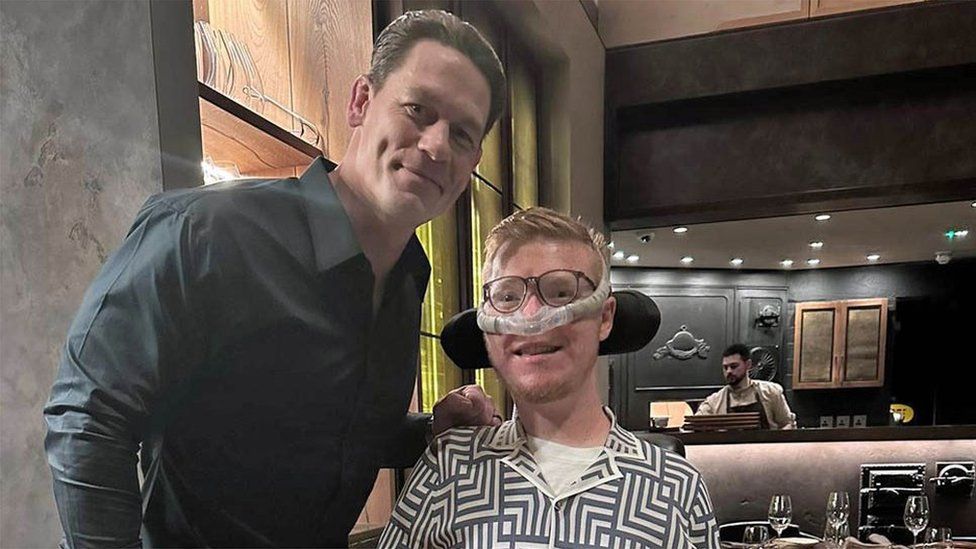
Image source, Family picture
In the past four years in England and Wales, the annual spend on long-term Continuing Healthcare patients living at home has risen from just over £30,000 to nearly £48,000 per person – data from 33 out of 50 health and social care boards has shown via Freedom of Information requests.
The managing director of the company behind the Beacon helpline, Dan Harbour, said this was positive – but that it was crucial for more to be done to tackle the national shortage of care workers, to improve training, and to ensure that guidelines were being followed.
He said when it came to commissioning and managing Continuing Healthcare for patients, “there are pockets of really good practice and pockets of quite appalling practice in [different] parts of the country”.
The Department for Health and Social Care said arrangements for Continuing Healthcare should place the individual at the centre of the process.
A spokesperson said: “To support ICBs in their provision of this, we’ve made up to £7.5bn available to help reduce adult social care waiting times and increase workforce capacity.” They added that the government has made a further commitment to boost staff retention.
Alex says the stress of finding care has “robbed” her and Declan of joyful times together, and taken her to breaking point.
They hope in these coming months Declan will still be able to complete items on his bucket list – a huge car enthusiast, he’s already added a new body kit to his adaptable van, and he’s been in the pit lane at the British GT Championship. He also met Fast and Furious actor John Cena in a chance encounter.
“Even when you’re disabled, you can still do your dreams,” Declan says.
And for Alex, it’s just about being together with her son, “the amazing, funny, intelligent, incredible person he is”.

What are your experiences of Continuing Healthcare? You can get in touch by emailing haveyoursay@bbc.co.uk.
Please include a contact number if you are willing to speak to a BBC journalist. You can also get in touch in the following ways:
- WhatsApp: +44 7756 165803
- Tweet: @BBC_HaveYourSay
- Upload pictures or video
- Please read our terms & conditions and privacy policy
If you are reading this page and can’t see the form you will need to visit the mobile version of the BBC website to submit your question or comment or you can email us at HaveYourSay@bbc.co.uk. Please include your name, age and location with any submission.